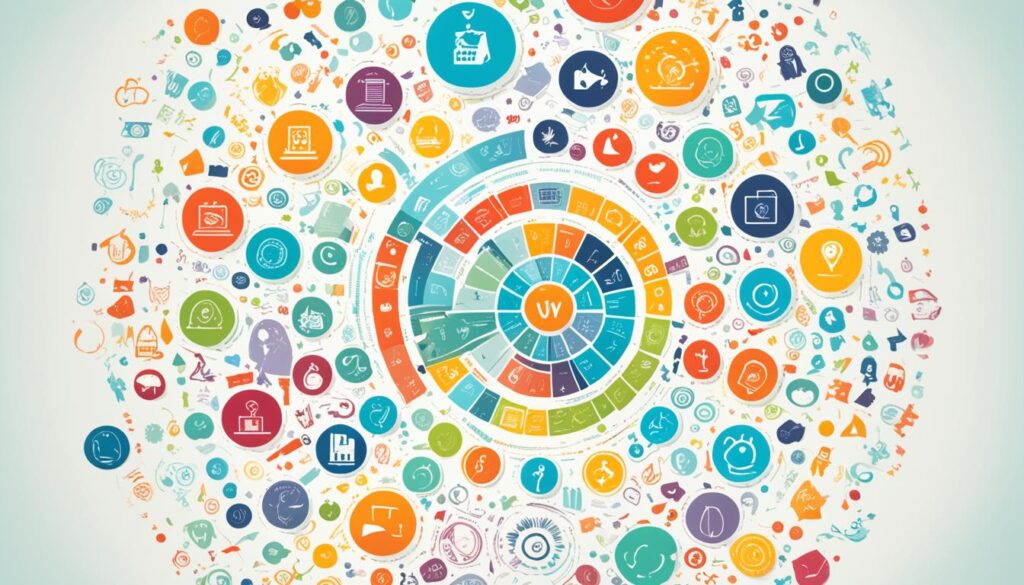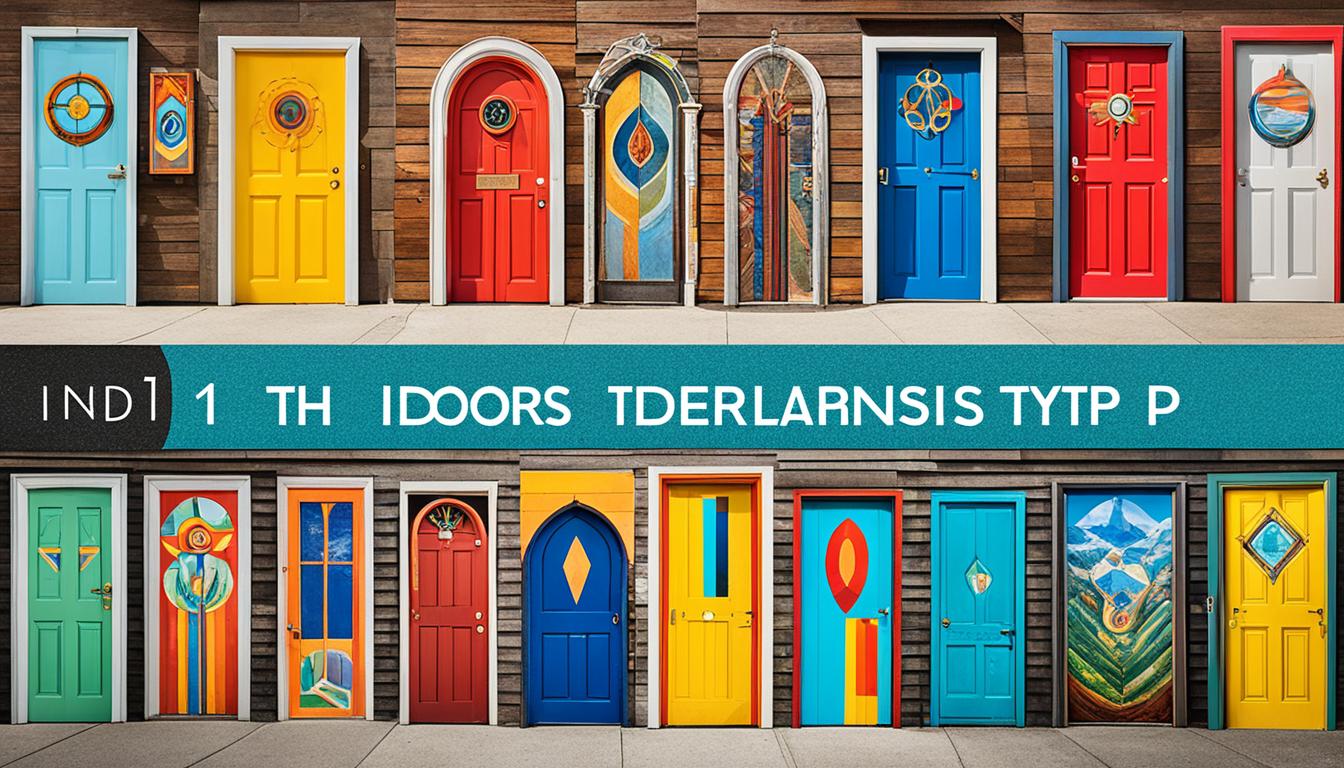Were you aware that the 16 Type Personality Test, often referred to as the Myers-Briggs Type Indicator (MBTI), has attracted more than 88 million participants globally? This impressive figure represents a multitude of people endeavoring to gain deeper self-insight and to realize their inherent capabilities.
Embarking on a journey of self-discovery and personal development is a powerful endeavor, and the 16 Type Personality Test serves as a valuable tool in this process. By delving into the intricacies of our personalities, we can gain insights into our unique strengths, preferences, and communication styles.
In this comprehensive guide, we will explore the world of the 16 Type Personality Test and delve into its significance in unlocking our true selves. Join us as we uncover the history and evolution of the MBTI, dive into the framework of the 16 personality types, and discover the benefits of taking this transformative test.
Are you ready to embark on a journey of self-discovery and personal growth? Let’s uncover your true self through the fascinating world of the 16 Type Personality Test.
Key Takeaways:
- The 16 Type Personality Test, also known as the Myers-Briggs Type Indicator (MBTI), has been taken by over 88 million people worldwide.
- The test is a valuable tool for understanding our unique strengths, preferences, and communication styles.
- In this comprehensive guide, we will explore the history, framework, and benefits of the 16 Type Personality Test.
- Embarking on a journey of self-discovery and personal development can lead to uncovering the true potential within ourselves.
- Join us as we dive into the fascinating world of the 16 Type Personality Test and uncover your true self.
What is the 16 Type Personality Test?
The 16 Type Personality Test is a popular assessment tool used to gain valuable insights into one’s personality traits and preferences. By understanding your unique personality type, you can uncover important aspects of your true self, allowing for personal growth, improved communication, and better decision-making.
What is the MBTI® assessment?
The MBTI® assessment is a psychometric questionnaire designed to measure psychological preferences in how people perceive the world and make decisions. It is based on the work of Swiss psychiatrist Carl Jung and was created by Isabel Briggs Myers and her mother, Katharine Cook Briggs. The MBTI® assessment is often used in the field of psychology and personal development to help individuals better understand themselves and others, as well as to improve communication and decision-making skills.
The assessment categorizes individuals into one of 16 different personality types based on their preferences in four key areas: extraversion/introversion, sensing/intuition, thinking/feeling, and judging/perceiving.
While the MBTI® assessment is widely used and can provide valuable insights, it is important to note that it is not without its criticisms. Some psychologists and researchers have questioned its reliability and validity, as well as its ability to predict behavior or performance. Additionally, the assessment has been criticized for oversimplifying complex personality traits and potentially leading to stereotyping or bias.
Despite these criticisms, the MBTI® assessment remains a popular tool for self-discovery and personal growth, and many individuals and organizations continue to find value in its insights. It is often used in career counseling, team-building exercises, leadership development programs, and academic and professional settings.
Understanding the Basics of Personality Assessment
Personality assessment is the process of evaluating an individual’s traits, behaviors, and characteristics to gain a deeper understanding of their personality. The 16 Type Personality Test is based on the theory developed by Isabel Myers and Katharine Briggs, which suggests that individuals can be categorized into 16 different personality types.
History and Evolution of the Myers-Briggs Type Indicator® (MBTI®)
The Myers-Briggs Type Indicator® (MBTI®) is a widely recognized and respected personality assessment tool that builds upon the work of Myers and Briggs. Developed by Isabel Myers and influenced by the theories of Swiss psychologist Carl Jung, the MBTI has evolved over time to become one of the most popular personality tests in the world.
The Influence of Isabel Myers and Katharine Briggs on Personality Typing
Isabel Myers and Katharine Briggs dedicated extensive research and study to develop their theory of personality typing. Their work was influenced by Carl Jung’s psychological types and aimed to provide individuals with a framework for understanding themselves and others. Today, their contributions continue to shape the field of personality assessment.
The Framework and Structure of the 16 Personality Types
The 16 personality types in the 16 Type Personality Test are characterized by four dichotomies: Extraversion (E) vs. Introversion (I), Sensing (S) vs. Intuition (N), Thinking (T) vs. Feeling (F), and Judging (J) vs. Perceiving (P). These dichotomies create a matrix that allows individuals to identify their unique personality type based on their preferences.
FAQs About the 16 Type Personality Test
- Q: How accurate is the 16 Type Personality Test?
- A: The accuracy of the 16 Type Personality Test can vary depending on the individual’s self-awareness and the quality of the assessment tool used. However, when taken with sincerity and answered honestly, the test can provide valuable insights into an individual’s personality.
- Q: How long does it take to complete the 16 Type Personality Test?
- A: The duration of the test can vary, but it typically takes around 15 to 20 minutes to complete.
- Q: Can personality types change over time?
- A: While personality types tend to remain relatively stable throughout life, it is possible for individuals to experience shifts and changes in their preferences as they grow and develop.
- Q: Can the 16 Type Personality Test be used for career guidance?
- A: Yes, the 16 Type Personality Test can be a valuable tool for career guidance. By understanding your personality type, you can gain insights into your strengths, work preferences, and potential career paths.
Exploring the 16 Personality Types
In this section, we will take a deep dive into the fascinating world of the 16 personality types. Each of these types offers unique insights into an individual’s preferences, behaviors, and characteristics. Understanding these personality types can provide valuable insights into ourselves and those around us.
Inner World vs. Outer World: The Introverted and Extroverted Types
One of the key dimensions of the 16 personality types is the distinction between introversion and extroversion. Introverted individuals tend to be more focused on their inner world of thoughts and feelings, seeking solitude and reflecting on their experiences. On the other hand, extroverted individuals thrive in social situations, gaining energy from interacting with others and being in the external world.
Sensing vs. Intuition: Understanding Information Intake
The next dimension we’ll explore is sensing versus intuition. This dimension relates to how individuals gather information from the world around them. Sensing types prefer concrete, tangible information and rely on their five senses to process information. Intuitive types, on the other hand, are more inclined towards abstract thinking, relying on patterns, connections, and their intuition to understand the world.
Thinking vs. Feeling: Making Decisions and Processing Information
The third dimension focuses on how individuals make decisions and process information. Thinking types tend to prioritize logic and rationality, making decisions based on objective criteria and facts. Feeling types, on the other hand, prioritize emotions and values, making decisions based on personal values and the impact on relationships and others.
Judging vs. Perceiving: Approach to the Outside World
The final dimension we’ll explore is judging versus perceiving. This dimension relates to how individuals interact with the outside world. Judging types prefer structure, organization, and making decisions, seeking closure and closure in their lives. Perceiving types, on the other hand, prefer flexibility, spontaneity, and keeping their options open, embracing new possibilities and adapting to change.
The 16 Personalities: From INFP to ESTJ
Now, let’s take a closer look at each of the 16 personality types. From the introspective and compassionate INFP to the practical and organized ESTJ, each type has its unique strengths, weaknesses, and perspectives on life. Understanding these personalities can provide valuable insights into ourselves and others, helping us navigate relationships, make career choices, and achieve personal growth.

| Personality Type | Description |
|---|---|
| ISTJ | Considered the Inspector, ISTJs are logical, organized, and responsible individuals who value tradition and order. |
| ISFJ | Known as the Protector, ISFJs are dedicated, loyal, and empathetic individuals who prioritize the well-being of others. |
| INFJ | The Advocate, INFJs are insightful, empathetic, and idealistic individuals who are driven by their desire to make a positive impact in the world. |
| INTJ | Referred to as the Architect, INTJs are strategic, independent, and visionary individuals who possess a natural aptitude for understanding complex systems. |
| ISTP | Known as the Craftsman, ISTPs are resourceful, adaptable, and hands-on individuals who excel in solving practical problems. |
| ISFP | Creative and sensitive, ISFPs are often referred to as the Composer. They have a deep appreciation for beauty and enjoy expressing themselves through art and creativity. |
| INFP | The Healer, INFPs are empathetic, compassionate, and deeply values-driven individuals who strive to make a positive difference in the lives of others. |
| INTP | Known as the Thinker, INTPs are analytical, logical, and independent individuals who have a natural curiosity and love for learning. |
| ESTP | Referred to as the Dynamo, ESTPs are energetic, adventurous, and spontaneous individuals who thrive in high-energy environments. |
| ESFP | ESFPs, also known as the Performers, are energetic, friendly, and fun-loving individuals who thrive in social settings and enjoy entertaining others. |
| ENFP | ENFPs, often called the Champion, are enthusiastic, warm, and highly creative individuals who are passionate about advocating for their beliefs. |
| ENTP | Referred to as the Visionary, ENTPs are innovative, intellectual, and adaptable individuals who excel in generating new ideas and exploring possibilities. |
| ESTJ | Known as the Supervisor, ESTJs are practical, organized, and decisive individuals who thrive in structured environments that require efficiency and order. |
| ESFJ | Referred to as the Provider, ESFJs are warm, caring, and nurturing individuals who prioritize the well-being and happiness of others. |
| ENFJ | ENFJs, often called the Teacher, are charismatic, empathetic, and inspiring individuals who are natural leaders and motivators. |
| ENTJ | Known as the Commander, ENTJs are confident, assertive, and strategic individuals who excel in leadership roles and driving results. |
Benefits of Taking a Personality Test
Taking a personality test can provide individuals with numerous benefits, helping them gain valuable insights into their unique preferences and strengths. By understanding oneself better, one can improve communication and understanding in relationships, enhance self-awareness and personal development, utilize test results for career and professional growth, and apply the Myers-Briggs Type Indicator® (MBTI®) in various settings.
Recognizing and Celebrating Your Unique Preferences and Strengths
A personality test allows individuals to identify their unique preferences and strengths, enabling them to appreciate their own personal qualities. By recognizing and celebrating these attributes, individuals can develop a sense of self-acceptance and gain confidence in their abilities.
Improving Communication and Understanding in Relationships
Understanding one’s personality type can also enhance communication and understanding in relationships. By recognizing and appreciating the different preferences and strengths of others, individuals can communicate more effectively, resolve conflicts constructively, and foster harmonious relationships.
Enhancing Self-Awareness and Personal Development
Self-awareness plays a crucial role in personal development. Personality tests offer individuals the opportunity to gain a deeper understanding of their own behaviors, motivations, and reactions. This heightened awareness enables individuals to make more conscious choices, overcome challenges, and pursue personal growth and development.
Utilizing Test Results for Career and Professional Growth
Personality tests are also valuable tools for career and professional growth. By understanding one’s personality type, individuals can align their career choices with their strengths, preferences, and values. This alignment can lead to greater job satisfaction, increased productivity, and improved performance in the workplace.
Applying the Myers-Briggs Type Indicator® (MBTI®) in Various Settings
The Myers-Briggs Type Indicator® (MBTI®) is a widely recognized and respected personality assessment tool. By applying the insights gained from the MBTI in various settings, such as team dynamics, leadership development, and conflict resolution, individuals can navigate interpersonal interactions more effectively and contribute to a positive and productive environment.

| Benefits of Personality Tests | Descriptions |
|---|---|
| Recognizing and Celebrating Your Unique Preferences and Strengths | Gain a deeper understanding of your personal qualities and develop self-acceptance and confidence. |
| Improving Communication and Understanding in Relationships | Foster harmonious relationships by appreciating and accommodating the preferences and strengths of others. |
| Enhancing Self-Awareness and Personal Development | Make conscious choices, overcome challenges, and pursue personal growth by gaining a deeper understanding of your behaviors and motivations. |
| Utilizing Test Results for Career and Professional Growth | Align your career choices with your strengths, preferences, and values to enhance job satisfaction and performance. |
| Applying the MBTI in Various Settings | Utilize the insights gained from the MBTI to navigate interpersonal interactions and contribute to a positive and productive environment. |
How to Take a Free 16 Type Personality Test?
When it comes to unlocking your true self, taking a free 16 Type Personality Test can be an enlightening experience. In this section, we will guide you through the process of accessing and taking the test, as well as understanding and interpreting the results.

Exploring Online Platforms for Accessing Free Personality Tests
There are several online platforms that offer free 16 Type Personality Tests. These tests are designed to help you gain insights into your unique personality traits and preferences. By exploring these platforms, you can find a test that suits your needs and preferences.
Navigating the Process of Taking the Test and Understanding the Results
Once you’ve found a suitable online platform, you can begin the test process. The test usually consists of a series of questions designed to assess your personality traits. Take your time to answer honestly and thoughtfully. After completing the test, you will receive your test results. It’s important to take the time to understand the meaning behind your results and how they relate to your personality.
Interpreting and Applying the Insights Gained from the Test
Interpreting the insights gained from the test can be a valuable exercise in self-discovery. Reflect on your test results and consider how they align with your thoughts, feelings, and behaviors. Use the insights to gain a deeper understanding of yourself and your strengths and weaknesses. Apply this knowledge to areas such as personal growth, relationships, and career development.
Comparing and Contrasting Different Platforms and Their Assessment Techniques
While there are many online platforms that offer free personality tests, each platform may have different assessment techniques. Take the time to compare and contrast these platforms to find the one that best suits your needs. Consider factors such as the comprehensiveness of the test, the type of questions asked, and the accuracy of the results.
Factors to Consider When Choosing a Reliable Source for Personality Testing
When choosing an online platform for personality testing, it’s important to consider the reliability of the source. Look for platforms that are backed by research and reputable organizations. Consider user reviews and feedback to gauge the legitimacy and accuracy of the tests offered. Ensuring that you are using a reliable source will give you confidence in the validity of your test results.
Deep Dive into the Myers-Briggs Type Indicator® (MBTI®)
In this section, we will delve deeper into the Myers-Briggs Type Indicator® (MBTI®) and explore its various aspects. The MBTI is a widely used personality assessment tool that provides valuable insights into individual differences and preferences. Understanding the MBTI and its applications can greatly contribute to self-awareness, personal growth, and professional development.
Overview of the Myers-Briggs Type Indicator® (MBTI®) and Its Relevance
The MBTI is based on the psychology of Swiss psychiatrist Carl Jung and was developed by mother-daughter duo Isabel Myers and Katharine Briggs. It assesses individuals across four dichotomies that capture fundamental preferences in how we perceive the world and make decisions. These preferences contribute to shaping our unique personalities.
The relevance of the MBTI lies in its ability to provide individuals with a framework for understanding themselves and others. By embracing the MBTI, individuals gain insights into their own behavior, communication style, and approach to problem-solving. This deeper understanding enhances personal relationships, career choices, and overall well-being.
Applications of MBTI® in Personal and Professional Contexts
The MBTI finds applications in a wide range of personal and professional contexts. In personal settings, it can help individuals improve communication, resolve conflicts, and strengthen relationships. Understanding one’s own preferences and respecting the differences in others promotes empathy and creates healthier interactions.
Professionally, the MBTI is utilized in areas such as team building, leadership development, and career planning. By identifying individual strengths and areas for growth, the MBTI empowers individuals to make informed decisions about their professional paths, improve teamwork and collaboration, and enhance overall job satisfaction.
Understanding the Four Dichotomies and Their Impact on Personality Typing
The MBTI assesses individuals across four dichotomies: Extraversion (E) vs. Introversion (I), Sensing (S) vs. Intuition (N), Thinking (T) vs. Feeling (F), and Judging (J) vs. Perceiving (P). These dichotomies represent contrasting preferences and influence various aspects of personality typing.
The extraversion-introversion dichotomy captures how individuals gain energy and focus their attention. Sensing and intuition reflect how individuals gather and process information. Thinking and feeling represent decision-making preferences, while judging and perceiving describe how individuals approach the outside world and deal with the external environment.
Debunking Common Misconceptions and Criticisms Surrounding MBTI®
Like any widely recognized assessment tool, the MBTI has attracted its fair share of misconceptions and criticisms. It is important to address these to glean a deeper understanding of the MBTI’s validity and limitations.
Common misconceptions include the belief that the MBTI categorizes individuals into rigid boxes or that it predicts behavior with 100% accuracy. In reality, the MBTI is a framework that describes natural preferences rather than strict classifications. It provides valuable insights into personality but does not determine or restrict one’s potential.
Criticisms typically revolve around the lack of scientific evidence supporting the MBTI or the belief that it is overly simplistic. While the MBTI has undergone rigorous testing and continues to be refined, it is important to view it as a tool rather than an all-encompassing theory of personality.
Embracing the Uniqueness and Flexibility of the MBTI® Framework
One of the strengths of the MBTI is its recognition of the uniqueness of individuals. Each of us possesses a distinct combination of preferences that shape our personalities and behaviors. The MBTI celebrates this diversity and provides a language to discuss and appreciate these differences.
Furthermore, the MBTI framework allows for flexibility and growth. It acknowledges that individuals can develop and adapt their preferences over time, enabling personal and professional development. This flexibility encourages continuous learning and self-improvement.

| Myth | Fact |
|---|---|
| The MBTI labels people as good or bad. | The MBTI illuminates preferences, not value judgments. |
| The MBTI cannot account for individual variation. | The MBTI acknowledges the uniqueness of each individual. |
| The MBTI predicts behavior with complete accuracy. | The MBTI provides insights into natural preferences but does not determine behavior. |
| The MBTI limits personal growth and development. | The MBTI framework allows for flexibility and encourages self-improvement. |
Conclusion
In conclusion, the 16 Type Personality Test is a powerful tool for unlocking your true self. By understanding the basics of personality assessment, exploring the 16 personality types, and recognizing the benefits of taking a personality test, you can embark on a journey of self-discovery and personal development.
The test provides insights into your unique preferences and strengths, improves communication and understanding in relationships, enhances self-awareness, and opens up possibilities for career and professional growth. It is an invaluable resource in various personal and professional settings.
We encourage you to take the test and explore the world of personality typing. Embrace the Myers-Briggs Type Indicator® (MBTI®) framework, debunk misconceptions, and celebrate the uniqueness and flexibility it offers. The 16 Type Personality Test is your guide to understanding yourself better and living a more fulfilled and authentic life.
FAQ
What is the 16 Type Personality Test?
The 16 Type Personality Test is a psychological assessment based on the Myers-Briggs Type Indicator® (MBTI®) framework. It categorizes individuals into one of 16 personality types, providing insights into their preferences, strengths, and ways of interacting with the world.
How can the 16 Type Personality Test help me?
The test can help you gain a better understanding of yourself and your unique preferences. It can improve communication and enhance relationships, boost self-awareness and personal development, guide career choices, and provide insights for personal growth in various settings.
How accurate are the test results?
The 16 Type Personality Test is designed to provide you with valuable insights into your personality. While it can be a helpful tool for self-discovery and personal development, it is important to remember that it is based on self-reporting and individual interpretation.
Can my personality type change over time?
While the core aspects of your personality tend to remain stable, your preferences and behaviors may shift over time due to personal growth, life experiences, and environmental factors. The 16 Type Personality Test can offer insight into these shifts and help you understand yourself better.
Can the 16 Type Personality Test help me in my romantic relationships?
Yes, the test can provide valuable insights into your own and your partner’s personality types, helping you understand each other’s preferences, strengths, and areas of potential conflict. This understanding can enhance communication, empathy, and overall relationship satisfaction.
Who can benefit from taking the 16 Type Personality Test?
The test is beneficial for anyone seeking self-improvement, personal growth, and a deeper understanding of themselves and others. It can be valuable in various contexts, including personal relationships, career development, team building, and leadership training.
Are the results of the 16 Type Personality Test completely accurate?
The test provides a general profile of your personality based on your responses, but it is important to remember that it is not an exact science. It offers insights into your preferences and tendencies but should not be used as a strict measure of your entire personality.
How can I take a free 16 Type Personality Test?
There are several online platforms that offer free 16 Type Personality Tests. Simply search for “free 16 Type Personality Test” and choose a reputable platform to begin your assessment.
How do I interpret the results of the 16 Type Personality Test?
The results will provide you with a four-letter code representing your personality type. Each letter represents a preference in four dimensions: extraversion or introversion, sensing or intuition, thinking or feeling, and judging or perceiving. Understanding these preferences will provide insights into your personality.
Can the 16 Type Personality Test help me in choosing the right career?
Yes, the test can offer insights into your strengths, preferences, and natural inclinations, which can help guide you in finding a career that aligns with your personality type. It is a valuable tool for self-reflection and career exploration.
Can I retake the 16 Type Personality Test if I am not satisfied with my results?
Yes, you can retake the test if you wish to explore different aspects of your personality or if you’re not completely satisfied with your initial results. Retaking the test may provide further insight and help you gain a more comprehensive understanding of yourself.
What is the 16 Type Personality Test?
The 16 Type Personality Test is a questionnaire based on the Myers-Briggs Type Indicator (MBTI®) that is designed to determine a person’s personality type. It assesses preferences in how people perceive the world and make decisions, resulting in 16 distinct personality types.
How can I take the 16 Type Personality Test?
You can take the 16 Type Personality Test online through various platforms such as 16personalities or Truity, where the test is offered for free.
What are the 16 different personality types?
The 16 different personality types include INFJ, INTP, INTJ, ENFP, ENFJ, ENTP, ENTJ, ISFP, ISFJ, ISTP, ISTJ, ESFP, ESFJ, ESTP, and ESTJ. Each type is a combination of four key descriptors.
How can the 16 Type Personality Test help me better understand myself?
A: The test can help you better understand your natural preferences and tendencies, which can provide insight into your strengths, weaknesses, and how you interact with others. It can also help you identify areas for personal and professional growth.
Are the results of the 16 Type Personality Test accurate?
The accuracy of the test results depends on the individual’s honesty and self-awareness when answering the questions. While it provides valuable insights, it’s important to approach the results with an open mind and use them as a tool for self-reflection.
How can knowing my personality type benefit me?
Understanding your personality type can help you navigate relationships, career choices, and personal development more effectively. It can also enhance your self-awareness and provide a framework for better communication and conflict resolution.
Can our personality type change over time?
While our core personality type tends to remain consistent, it is possible for shifts in personality to occur gradually, especially as individuals develop new skills, gain life experiences, and adapt to different environments.
Is the Myers-Briggs Type Indicator (MBTI®) assessment affiliated with any particular organization?
The MBTI® assessment and its related trademarks are owned by the Myers-Briggs Company and its affiliates. However, it is widely used by various organizations and individuals for personal and professional development.
Can the Enneagram test be used alongside the 16 Type Personality Test?
Yes, the Enneagram test and the 16 Type Personality Test can complement each other in providing a more comprehensive understanding of a person’s personality. While the 16 Type Personality Test focuses on cognitive functions, the Enneagram test delves into deeper motivations and fears.









